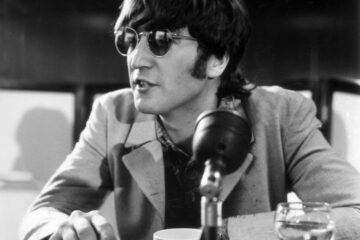While a number of different factors contributed to The Beatles’ success, the songwriting partnership of John Lennon and Paul McCartney was undeniably one of the most vital aspects of the entire band. A great deal of their hits revolved around the duo’s talent, and they became one of the most synonymous creative voices in music.
What was exciting about John Lennon and Paul McCartney wasn’t what they had in common but their differences. They could creatively push one another and use their combined know-how to get past any significant instances of writer’s block. They had different ideas when it came to making music, which meant that songs could be experimented with, leading them to come to ideas they wouldn’t have been able to arrive at on their own.
Their image as a songwriting duo within the band created some division, though. George Harrison was a prolific songwriter, but many of his ideas were set aside as they didn’t fit the standard Lennon and McCartney mould that the label found so important. Also, the pressure that was put on Lennon and McCartney to write meant they were exposed to their differences greatly. While these produced some great songs, they also led to tension within the band.
“That’s another McCartney. Smells a mile away, doesn’t it?” said Lennon when discussing the Beatles track ‘Hello, Goodbye’. “An attempt to write a single. It wasn’t a great piece; the best bit was the end, which we all ad-libbed in the studio, where I played the piano.” This reflected much of Lennon’s mindset towards the end of the Beatles, as he could no longer identify with McCartney’s writing style and wanted to make music on his own.
Creative differences eventually led to the band’s breakup, and each member went on to have a successful solo career. George Harrison was finally able to record the music he wanted to make, McCartney continued writing hits, and suddenly, Lennon was without a writing partner with complete free reign to explore whatever he wanted creatively.
This meant dabbling with both theme and song structure. Regarding the theme, Lennon became much more honest with his songwriting, talking about his honest emotions more and even using his songs to talk about politics. This shouldn’t come as a surprise, as when you look at his favourite work from his time in the Beatles, the songs he likes the most are the ones where he felt he could be the most honest.
When talking about his favourite Beatles songs, he mentioned ‘Help’, saying, “I meant it, it’s real. The lyric is as good now as it was then, it’s no different, you know. It makes me feel secure to know that I was that sensible or whatever—well, not sensible, but aware of myself,” he said, “That’s with no acid, no nothing… well pot or whatever. It was just me singing, ‘help’, and I meant it, you know. I don’t like the recording that much, the song I like.”
Regarding song structure, Lennon dabbled with a few different techniques when it came to writing solo material, but again, you can reference Beatles songs and capture hints at what would eventually be his signature solo style. If you look towards the closing song of the band’s ’67 album, Sgt Pepper’s Lonely Hearts Club Band, you can begin to see fragments of his solo career begin to form.
Though every band member helped with the writing and recording of ‘A Day in the Life’, Lennon penned the main parts of the song, including the verse and chorus. He follows a unique structure when he writes on this song, as rather than diving straight into a chorus, which The Beatles did a lot of the time to make commercial hits, he has the listener in his pocket a little bit longer. He treats them to a pre-chorus and builds up to the main bulk of the song rather than running straight into it.
When you listen to some of Lennon’s successful solo songs, such as ‘Woman’ and ‘Jealous Guy’ he does the same thing. He doesn’t rush into a chorus but builds the song up like on ‘A Day in the Life’. This is an exciting method of songwriting that the Beatles didn’t do much. It allows a song to build and makes the eventual chorus feel much more satisfying when it eventually comes around.
When he started writing as a solo artist, Lennon likely looked back on his catalogue and thought long about the music he wanted to make. He had no restrictions and no one to but heads with, so he went with the themes and structure that he found the most honest and exciting. With the latter, he likely heard ‘A Day in the Life’ and was keen on using that same idea to create some solo work.
Now, when you listen to the closing track on Sgt Pepper, you are getting a glimpse into what would come after The Beatles.



